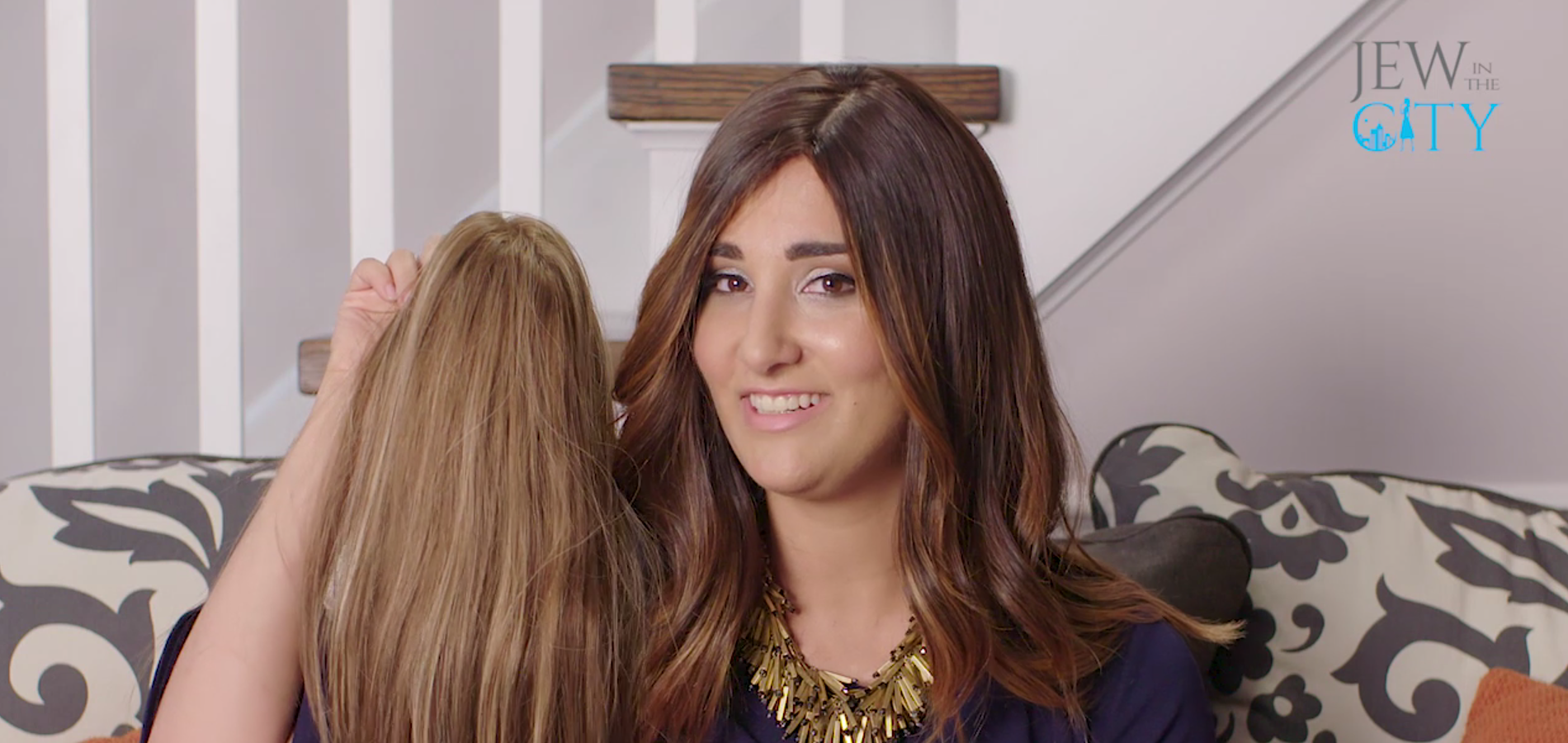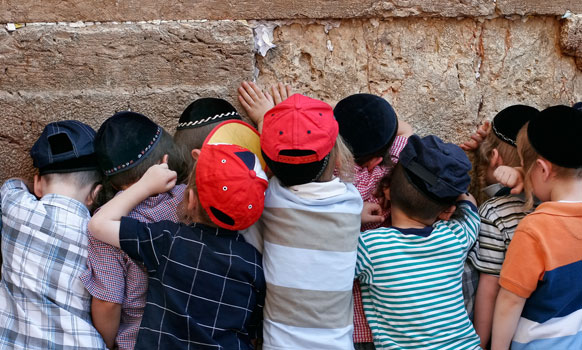How One Orthodox Jewish Mom Told Her Kids About Birds & Bees
Worrying doesn’t just run in the women of my family – it does marathons. And after hearing about a child abuse case in a pre-school California in the early 80’s, my mother was terrified of all the horrible ways my sisters and I could be kidnapped, killed, and molested (though not necessarily in that order). So she decided she ought to bring up “bad touching” pronto. But before she could address “bad touching,” she thought it only right to tell us kids – we were five and six at the time – about how good touching worked. So she sat us down on our family room couch one evening, gave us the basics, fielded a couple follow up questions, and without any pomp or circumstance, we had had “the talk.”
So many parents and children dread “the talk,” but before there was even time to fear it, it was over and done with for me. I always imagined I’d do things similarly with my own kids, but then I grew up, became an Orthodox Jew, got married, started a family and realized that I had no idea how I was going to handle this topic. How did Orthodox Jews discuss the facts of life with their kids anyway?
I had learned plenty since becoming religious – kosher, Shabbos, philosophy, Torah – my seminary covered a range of subjects. You could go (and I did) to classes around town to learn about parsha and halacha. But no one ever mentioned when or how you handled “the birds and the bees,” and as my oldest was approaching four, you guessed it, I was worried.
We went to a well-known outreach rabbi and rebbetzin for a Shabbos around when the worrying was intensifying. This woman had eight kids and seemed to have a very balanced approach, so I figured I’d pick her brain. Boy was she the right person to ask. She had actually given a class on the topic to a group of Jewish educators at an AJOP conference a few years earlier, but before she gave it, she interviewed a diverse group of Orthodox Jews: rabbis, teachers, mental health professionals, and the age they gave her for when to have “the talk” was anywhere from two years old to right before marriage.
What a relief it was for me to hear that in a matter like this there was a range of opinions and I could do whatever felt right. (P.S. – much closer to two than right before marriage!) I figured I’d just wait for my kids to bring it up. I even went and got pregnant again to help make the conversation natural! And as my belly grew each day, I wondered if and when my three and five your old would wonder how it happened. But alas, my daughters simply didn’t ask, so I didn’t tell.
Then, on a Shabbos morning, close to the end of my pregnancy, my 5 year old daughter asked why some eggs are eggs and others are chicks and I realized we finally had an opening to talk about how fertilization works for people too! I gave them the preface that what we were about to discuss was something very private and while they could ask follow up questions whenever they wanted to if it was just our family, they were never allowed to repeat this to their friends, or ask questions in mixed company. Thankfully they very much respected my rule and have felt comfortable enough to ask questions about this about this topic in private settings over the years.
Unlike the way my mom gave the talk, I used the word “tznius” (private) added in some ideas about how Hashem was part of the process of a mommy and daddy being together and a baby coming into the world. We are fortunate to send to an Orthodox Jewish day school which not only discusses puberty with the kids at the end of elementary school, they do a sex-ed talk in middle school as well. Each parent should figure out what works for their family, but I hope hearing about how we handled this gave you one less thing to worry about!
If you found this content meaningful and want to help further our mission through our Keter, Makom, and Tikun branches, please consider becoming a Change Maker today.








8 comments
Sort by
wow. I have orthodox friends who won’t even speak the anatomical terms for parts of the body to their kids!
The fact that you send your kids to a school that isn’t shy about sex is unusual, for normative Orthodox Jews. I came of age during the AIDS epidemic, and the local newspaper interviewed private-school principals about their approaches to sex ed. The menahel of the “modern” Hebrew day school said, “We’ll address it when our 8th graders are up to the biology and human reproduction unit in their science curriculum.” The menahel of the ‘mainstream yeshivish’ Yeshiva said, “We will not discuss it, period. It will never be mentioned in our classrooms.”
My “middle of the road” yeshiva high school, in conforming with NYS guidelines for “health” education, had a gynecologist come in to deliver a guest lecture when we were in 10th grade. He felt the need to explain the mechanics of sex, just in case there were boys in the room who didn’t know for certain. And there were.
And any Yeshiva to the right of mine just didn’t bother with “health” education.
Thanks for your comment, Mike. Our school would be considered right-wing modern or centrist. Of course not all Jewish schools discuss this but we chose one that does. And it’s not far-left, as I mentioned. Also, times are a changing from when you were a kid. And I don’t like the word “normative” – there are different communities which do different things.
I went ‘mainstream yeshivish’ and find this all too funny. We all knew what ‘having relations’ was by 5th grade. Some of us earlier. It just comes up too many times in Chumash, Mishnah (we weren’t up to Gemara, yet). It wasn’t ‘censored out’, but the use of euphemism meant it was off limits for casual discussion.
We understood it consummated a marriage and produced children and could be ‘fun’ in the way riding your bike is ‘fun’. (Not quite the same thing as pleasurable.)
By eighth grade, we had working knowledge of Nidah, Zavah, Yoledes and the differences between them. These are all treated similarly in ‘practical’, modern-day halacha, but in Gemara (as well as Chumash), they are distinct.
Any adult who thought they were going to teach us something would have had us rolling our eyes.
Note that the first Chapter of Kesuvos is standard material by 10th grade. You may or may not spend an entire winter on the subject, because different Masechtos are learned each semester/z’man on rotation.
But you know that all the public school kids are on BC, even if we skipped that chapter of our biology text in class.
I guess I speak from the chareidi circles when I say. In general we dont learn anything from the school. From the parents its very personal, my mother was open to questions, but never volenteered information… learned from friends. That said, I do plan on having the talk with my children when they are slightly older (as it comes up I answer questions) and they don’t talk about it in class.
I spoke to my kids about sex in a very open and honest way (we are orthodox.) I also made sure to let them know it’s not just for making babies and that it’s something couples do because it feels good. I let them know they could ask questions but i think they felt like they had heard enough!
How my parents explained the birds and bees to me: they never did. Like in most haredi communities, sex is a taboo subject that is never brought up nor discussed for “modesty reasons’. The closest thing to sex ed was learning about the halachic issues of shomer negiah. Premarital relationships with the opposite sex was frowned upon (to put it mildly) outside the context of shidduch dating. In other words, not only were we taught not to touch people of the opposite sex but we were told to avoid them at all costs without a concrete explanation apart from the fact that intermingling of the opposite sex is not a Jewish phenomenon. There is this assumption that because boys and girls are segregated from each other their entire lives, such parents don’t feel that it’s necessary to discuss the birds and the bees with their children. When is came to sex, it was assumed that we would learn more information through our kallah/chatan teachers who mostly focused on the laws of Niddah and provided very little details about “the deed” itself. Consequently, many couples struggle with marital intimacy and I heard one horror story after another, an act that is suppose to be natural. While I understand that ultra Orthodox communities want to protect the innocence of their children, I deplore their attitude towards the issue and doing so can cause a major strain and disharmony in their children’s marriages. Moreover, I feel that if you are not comfortable discussing the issue of sex outside the means of becoming pregnant, then you are not suitable to be a kallah/chatan teacher.
Wait, ok, are you accusing Alison of this or just a generalization?